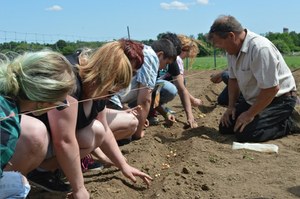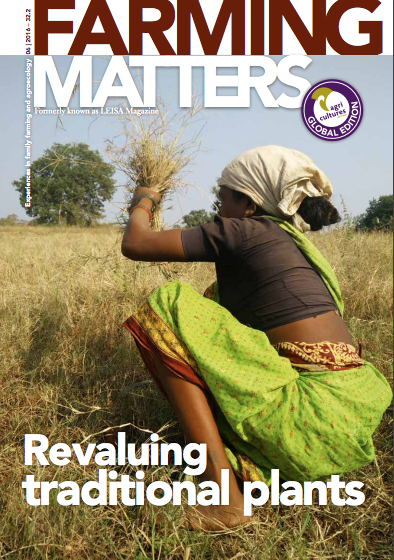Two years ago Shelley and Tony Spruit started Against the Grain, an initiative that is reviving heritage grains in Ontario, Canada, from field to fork. Their experience demonstrates how family farmers build seed sovereignty and educate consumers on their power to make change. In this article, their daughter Kristen writes their story. She explains how Shelley and Tony overcame various challenges on the farm and are forging innovative relationships to create new markets and enhance food sovereignty for farmers and consumers alike.

As farmers we have been entrusted with the seed for thousands of years. If we – the small farmers – do not continue to grow diverse, unique crops that are open pollinated and adaptable to the climate, we lose control of our food source,” said my mum Shelley, expanding on the importance of seed sovereignty, not only for Canadian food sovereignty, but also for farmers and consumers.
My parents, Shelley and Tony, have been farming for more than 28 years. They own and operate 97 hectares not far from Ottawa. Two years ago, in 2014, they decided to use about 16 hectares of their land to grow heritage grains for local markets. These are old varieties or species of grains that have not been hybridised or genetically modified to fit mainstream farming practices and have, as a result, been largely forgotten or neglected. This is important in a country where the diversity of grains has been dwindled down to almost nothing with the majority of farmers growing only a few varieties of maize, wheat and barley. Developing new and alternative production models and markets is therefore at the heart of Shelley and Tony’s efforts to revive heritage grains.
Growing Against the Grain

They aptly named their new venture ‘Against the Grain’ and started experimenting with a range of wheat and barley varieties – Purple Ethiopian Barley, Scottish Bere Barley, Tibetan Barley, Blue Utrecht Wheat, Einkorn Wheat, Black Emmer Wheat, Brazilian Laurus Wheat, Kamut and White Sonoma Wheat– amongst others. Although wheat and barley were not domesticated in Canada, generations of selection and breeding by Canadian farmers has resulted in locally-adapted heritage varieties. For instance, beta-glucan barley, which Tony and Shelley grow and sell, directly from the farm and, online. This variety was researched and developed specifically for the Canadian food market.The rarity of these grains created practical challenges, from difficulties to source enough seeds to acquiring suitable equipment to harvest, thrash, clean and store the grains. On top of this, finding other farmers who’ve grown these crops and can share information on the history and provide tips and tricks of the trade has been difficult. Overcoming these challenges has been a lesson in persistence. Each year Shelley and Tony learn more about the grains’ growing characteristics – planting time, row spacing, favoured soil type, resistance to wind and fungus and time to maturity. For instance, last spring it became evident that a number of these older varieties needed an additional step in the cleaning process to remove the hard outer shell of the grain and the long bracts. While it was not easy to find them, they have also been able to connect with other farmers who have, for instance, helped them with the equipment needed for harvest. Shelley and Tony are members of the Ontario Ecological Farmers Association. The organisation helps to connect farmers across Ontario looking to grow alternative grains, create seed banks and who are interested in small farm ownership. The membership has enabled them to connect with other like minded farmers along the way.
Heritage grains
‘Heritage’ and ‘ancient’ are often used interchangeably. Heritage grains are an alternative to so called mass-market grains and are seen as a part of the resistance against the consolidated seed industry. Three quarters of the worlds’ seed market is controlled by ten companies who concentrate on only a few crops and varieties. For example, in Canada, 95 % of seeds used to grow major crops are bred for uniformity and performance under routine use of synthetic inputs. Heritage grains are also becoming more popular amongst consumers where their superior nutritional properties are recognised and marketed. For example, purple corn has between 15 and 20 % more of the eight essential amino acids found in yellow corn.
New partnerships, new markets
Beyond the farm gate, the challenge of this adventure continues as markets still need to be created for nonGMO, open pollinated and non-patented seeds in Canada. This is where the connection between seeds and food comes in, and the role of building relationships between farmers and consumers. Shelley has invested in creating new partnerships with bakers, artisans, chefs and businesses across southern Ontario. As a result, several chefs and bakers in the Ottawa area now use Against the Grain products. For instance, one chef is substituting imported rice with Against the Grain barley berries. And a bakery in Ottawa sells various pastries and pies made with their barley flour and purple corn meal. Moreover, Against the Grain is currently working together with an enterprise that supplies food to 1200 schools to develop a healthy cookie made from barley flour.
There is increasing awareness amongst chefs and consumers about the importance of how grains are grown
There is increasing awareness amongst chefs and consumers about the importance of how grains are grown, and the correlation between non-GMO products and health. The response from customers has been overwhelming, particularly when consumers understand the health benefits of whole grains. “Seeing people interested and wanting to know more about heritage and Canadian grains is proof that there’s power to create change within the food and agriculture system,” said Shelley. A challenge in this arena has been to meet all the regulations for the processing of the grains, such as getting approval and meeting food processing and health standards for the millers that Against the Grain works with.
Keeping seed diversity alive
Shelley continues to work with new partners to build and broaden the movement to keep the seed genetic diversity alive in Canada. Against the Grain is working with scientists from the University of Manitoba to trial different varieties of grains to determine the suitability and productivity of these grains in various Canadian climates. Currently, three varieties of hulless oats – which are crosses of different heritage grains – are being tested.Wanting to maintain and expand seed diversity, Against the Grain donates their heritage seeds to organisations such as Seeds of Diversity and USC Canada, who have created seed banks with more than a thousand rare Canadian-adapted seed varieties. This project is organised through the Canadian Bauta Initiative, which works with various organisations to preserve rare varieties of seeds for future generations. And this spring, Shelley and Tony initiated a ’Grow a Row’ project on their farm – a community initiative where gardeners and farmers share their excess produce with local soup kitchens and food banks. As part of this effort, high school students will be growing heirloom tomatoes on Shelley and Tony’s farm and donate the produce to a local food bank.
While it’s never easy to take a different course than society dictates, Shelley has always been a believer in the notion that small steps can have big impacts: “We have the power to create change, one seed at a time.”
Kristen Spruit (kristen.spruit@gmail.com) is a communications student and journalism graduate. Her passion for travel has taken her to more than 40 countries around the world, providing inspiration for her second passion: writing. For more information visit www.againstthegrainfarms.ca

